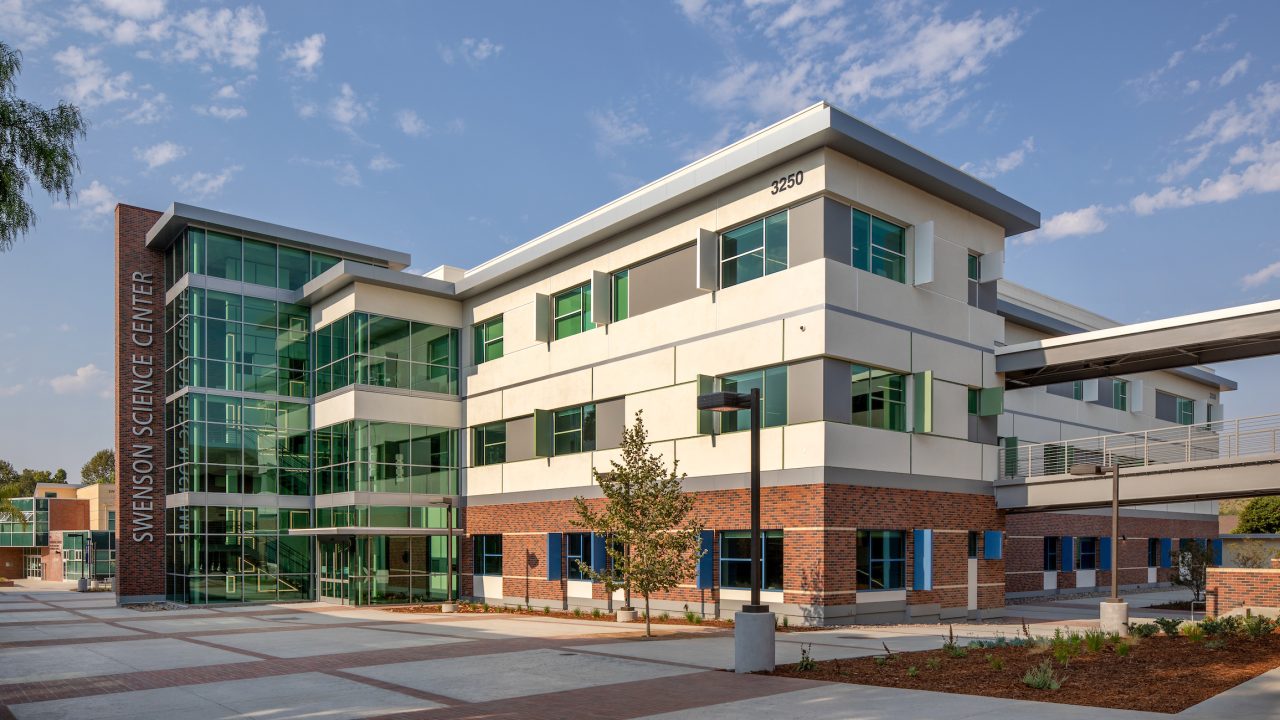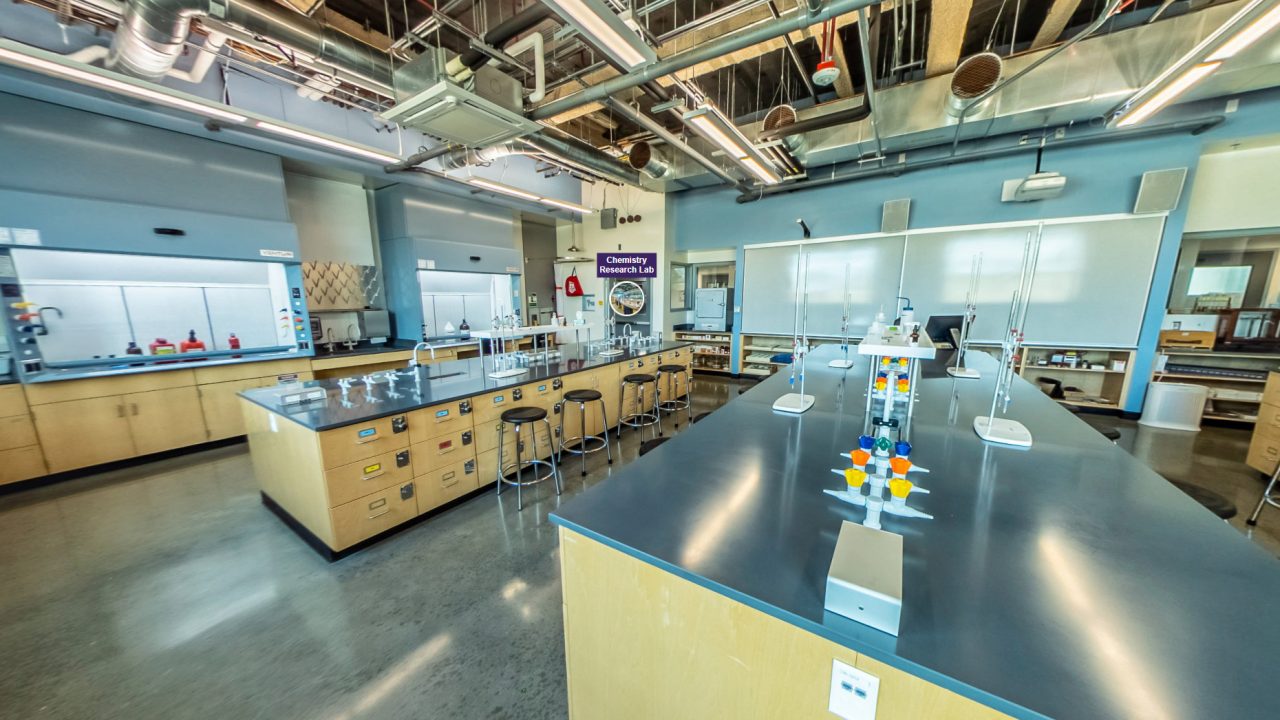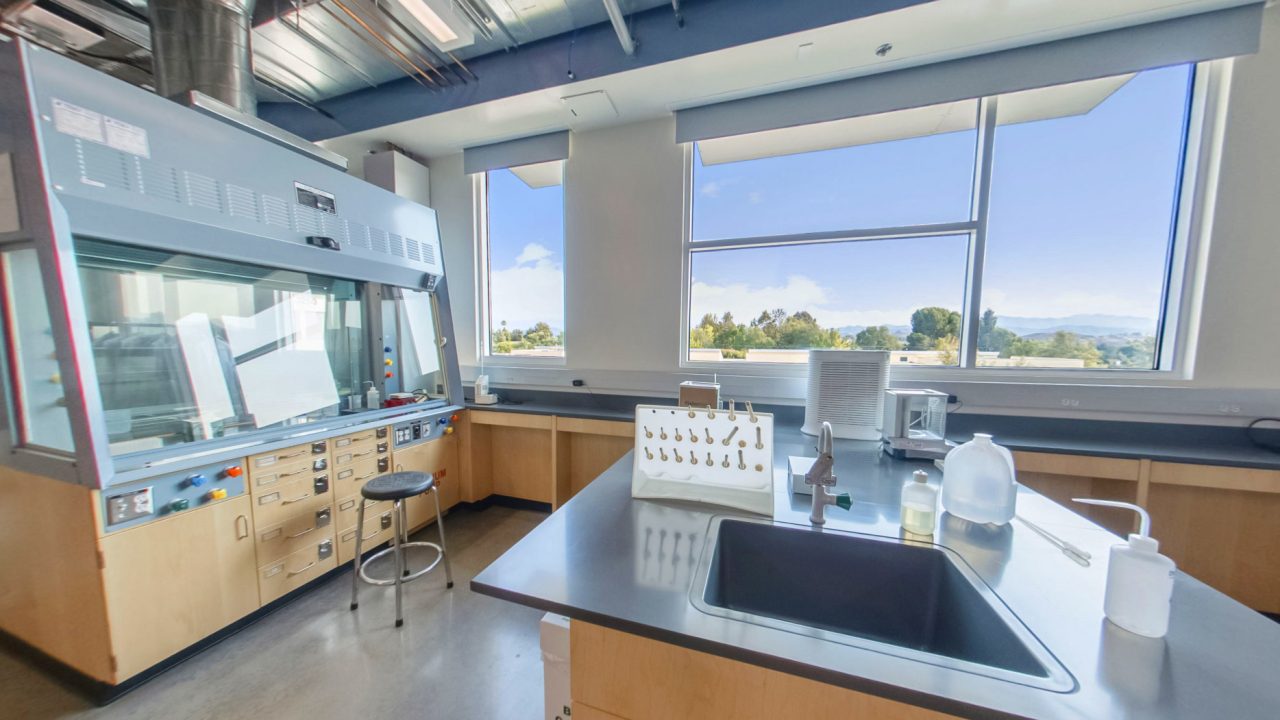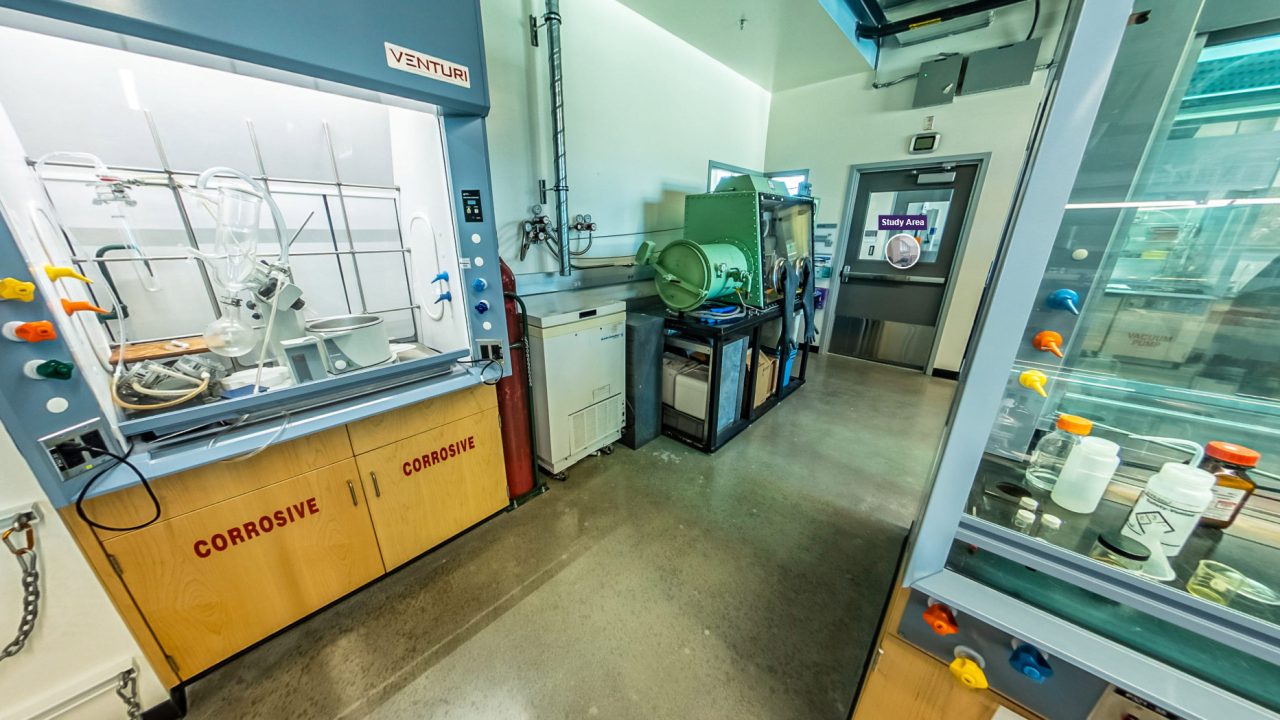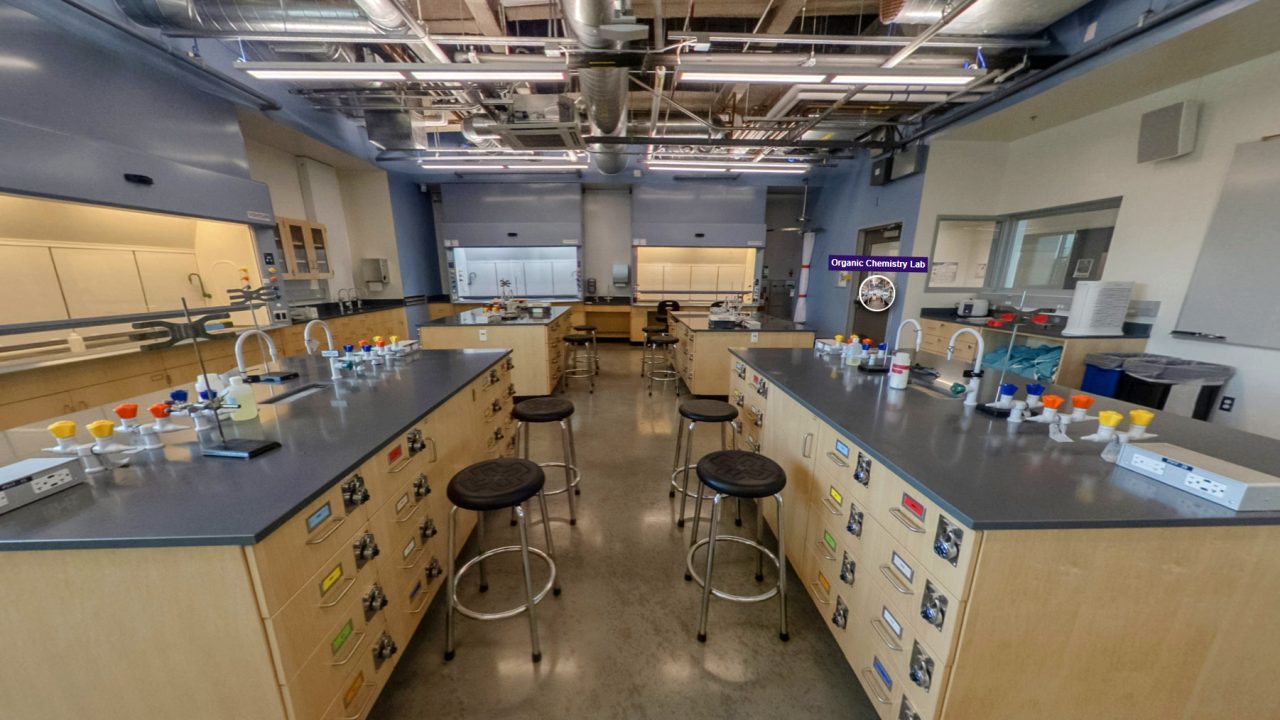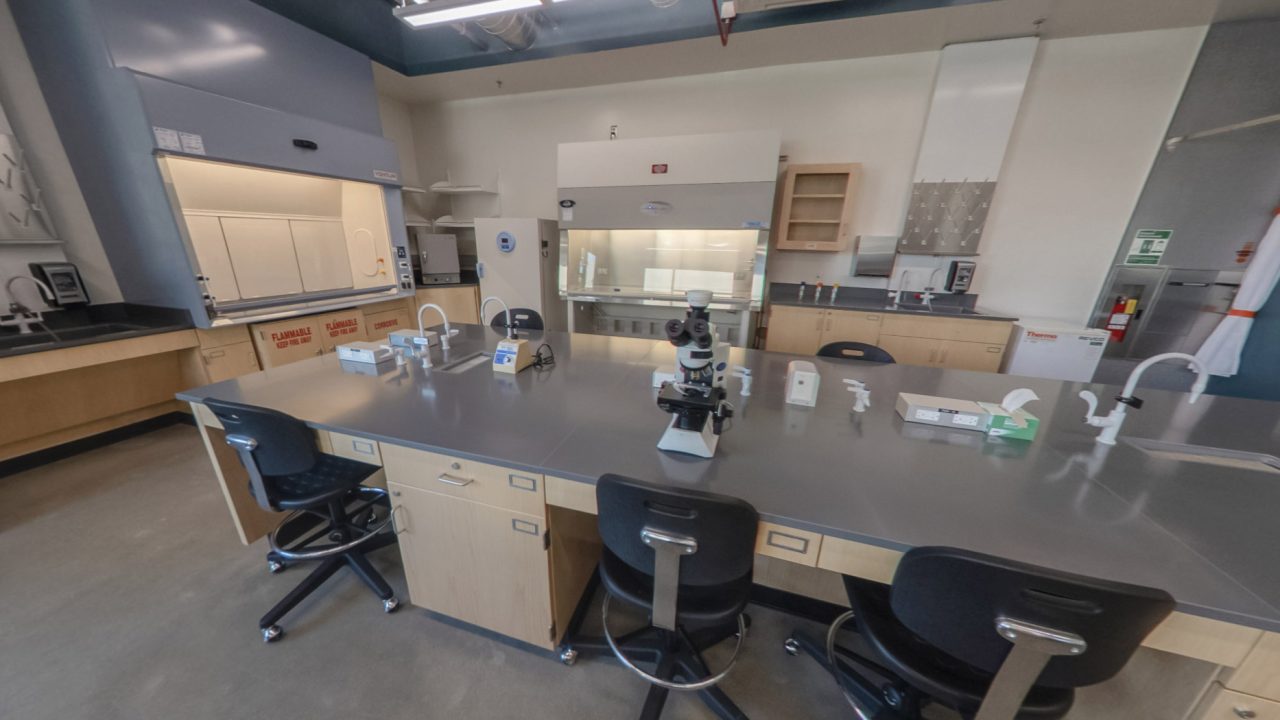Chemistry
Chemistry is the core science — the study of the properties, composition and changes that occur in matter.
When you study chemistry, you analyze issues that influence every aspect of life on earth.
Utilize cutting-edge lab equipment
Throughout your courses in the chemistry program, you will regularly work with the modern instruments in our campus laboratories. This equipment includes infrared, nuclear magnetic resonance and atomic absorption spectrophotometers.
Separations equipment includes capillary electrophoresis, gas chromatography, high pressure liquid chromatography, and fast protein liquid chromatography equipment. Detectors range from mass spectrometers, electron capture, and flame ionization to rapid-scan UV-Vis spectrometers. You will also learn skills in computation and presentation of data.
Participate in research that gets published
Our research labs are entirely staffed with student researchers to generate data that is published in international journals and presented at national conferences. Talk to us about whether there is an open project in our labs!
Choose your preferred degree path
We offer two degrees, each backed by a strong curriculum that will give you the knowledge base you need to successfully pursue the discipline.
- Bachelor of Science – If you are targeting a career in industry or planning to attend a graduate program.
- Bachelor of Arts – If you are seeking work in medicine, dentistry, or secondary school teaching.
At a Glance

Degree Type
Bachelor of Arts
Bachelor of Science
Department
School/College
College of Arts and Sciences
Next Steps
Interested in this major? Here's what you can do next:
With challenging and relevant courses, outstanding faculty, small class sizes, and an emphasis on hands-on learning, the chemistry program will position you to succeed in your chosen career.
Degree requirements
Find out what it takes to earn a degree in chemistry and explore the courses.
Highlighted Courses
Get familiar with some of the courses you might take in this major.
CHEM 305: Quantitative Analysis
Covers the principles and techniques of gravimetric and volumetric analysis.
Read descriptionCHEM 306: Chemical Instrumentation
Covers the theories and application of instrumentation in chemistry.
Read descriptionCHEM 332: Organic Chemistry II
Covers the structure, nomenclature, reactions and synthesis of organic compounds, plus the theory and mechanism of organic reactions.
Read descriptionCHEM 405: Physical Chemistry
The study of kinetic theory, structure of condensed phases, thermodynamics, equilibria, electrochemistry, quantum chemistry and chemical kinetics.
Read descriptionCHEM 411: Advanced Inorganic Chemistry
The advanced treatment of special topics in inorganic chemistry, including atomic structure, classification of elements and inorganic reactions in aqueous and non-aqueous solutions.
Read descriptionCHEM 485: Capstone Seminar
Introduces students to the skills and practices required of professional scientists. Students will gain experience with conducting literature searches, conducting and presenting scientific work, reviewing the work of others and writing research proposals.
Read descriptionRecommended Minors
Want to add even more value to your degree? Consider one of these minors to gain a unique combination of skills and perspectives.
Check out the spaces and tools you'll have access to in this major. Explore the entire Cal Lutheran campus with our virtual tour
We offer hands-on opportunities that give you the freedom to explore your passion through real-world work and prepare for a fulfilling career.
-
Conference Presentations
Many of our students have the opportunity to perform independent research with faculty advisors on campus and present their findings at research consortiums, such as our annual Festival of Scholars or off-campus conferences.
-
Research Opportunities
We offer numerous hands-on research experiences, including summer research fellowships. Students have also garnered recognition through California Heart Association grants, National Institutes of Health and National Science Foundation summer research posts, and internships at local biotechnology firms such as Amgen and Baxter — among the nation’s top biopharmaceutical corporations.
-
Learning in Action
We emphasize “doing” science and an active approach to learning. Throughout your classes, you’ll gain a lot of research experience by working side-by-side with your professors in state-of-the-art facilities. You’ll design experiments, collect scientific data, perform statistical analysis and share your conclusions through research papers and presentations.
-
Internships
You will have the opportunity to do an internship with organizations such as Ventura County Crime Lab and Amgen, or pursue an off-campus research experience.
-
STEM Living-Learning Community
Located in Conejo Hall, this program allows residential students in STEM majors to more frequently interact with peers and faculty members in their discipline, enabling them to easily form study groups. Additionally, STEM-focused programming provided by Residence Life staff and faculty members allows for integrated learning between the classroom and residence hall. Learn more
I always had an interest in science when I was in high school, but then I’ve had the tendency of exploring the chemical aspects of nature and all of that. It’s always been about the involvement in lab chemistry (for me) and I’ve learned more by taking classes at Cal Lutheran. It’s very engaging because you have to be very agile using the lab equipment.
For our students who have applied to graduate school, over 90% were admitted within two application cycles, and many of them went on to the most respected schools in the nation. Other students have opted for health-related programs such as medical or pharmacy school, physician’s assistant programs and teaching credentials.
Students who have entered the workplace after graduation have begun their careers in fields such as environmental controls management, consumer product research, drug discovery, toxicology and forensic chemistry.
Potential Careers
Medical and Clinical Laboratory Technologists
Perform complex medical laboratory tests for diagnosis, treatment, and prevention of disease. May train or supervise staff.
Read descriptionPharmacists
Dispense drugs prescribed by physicians and other health practitioners and provide information to patients about medications and their use. May advise physicians and other health practitioners on the selection, dosage, interactions, and side effects of medications.
Read descriptionForensic Science Technicians
Collect, identify, classify, and analyze physical evidence related to criminal investigations. Perform tests on weapons or substances, such as fiber, hair, and tissue to determine significance to investigation. May testify as expert witnesses on evidence or crime laboratory techniques. May serve as specialists in area of expertise, such as ballistics, fingerprinting, handwriting, or biochemistry.
Read descriptionChemists
Conduct qualitative and quantitative chemical analyses or experiments in laboratories for quality or process control or to develop new products or knowledge.
Read descriptionMaterials Scientists
Research and study the structures and chemical properties of various natural and synthetic or composite materials, including metals, alloys, rubber, ceramics, semiconductors, polymers, and glass. Determine ways to strengthen or combine materials or develop new materials with new or specific properties for use in a variety of products and applications. Includes glass scientists, ceramic scientists, metallurgical scientists, and polymer scientists.
Read descriptionBiochemists and Biophysicists
Study the chemical composition or physical principles of living cells and organisms, their electrical and mechanical energy, and related phenomena. May conduct research to further understanding of the complex chemical combinations and reactions involved in metabolism, reproduction, growth, and heredity. May determine the effects of foods, drugs, serums, hormones, and other substances on tissues and vital processes of living organisms.
Read descriptionRegulatory Affairs Specialists
Coordinate and document internal regulatory processes, such as internal audits, inspections, license renewals, or registrations. May compile and prepare materials for submission to regulatory agencies.
Read descriptionNatural Sciences Managers
Plan, direct, or coordinate activities in such fields as life sciences, physical sciences, mathematics, statistics, and research and development in these fields.
Read descriptionEmployers
Some of the organizations our graduates work for include:
- Baxter International Inc.
- BioSource International
- Cosmetic Technologies
- Food and Drug Administration (FDA)
- Fruit Growers Laboratory
- Gilead Sciences
- Los Angeles County Crime Lab
- NuSil Technology
- South Coast Air Quality Mgnt. Dist.
- Unity Lab Services
Graduate Schools
Our alumni have pursued advanced degrees at:
- Boston University
- Cornell University
- Emory University
- University of California, Los Angeles
- University of Colorado Health Sciences
- University of Maryland
- University of Notre Dame
- University of Oregon
- University of Rochester
- University of Southern California

The coursework at CLU prepared me for graduate school by giving me a strong foundation of fundamental concepts in biology and chemistry. I found the small classes allowed better interpersonal relationships with professors, making it easier to ask questions and grasp the material. The chemistry and biology major courses are all well-designed and engaging and taught me material I actually use in my current position.
Oliver Grant-Chapman
Biomedical Science PhD graduate student, St. Jude Children’s Research Hospital
This page includes information from O*NET OnLine by the U.S. Department of Labor, Employment and Training Administration (USDOL/ETA). Used under the CC BY 4.0 license. Some occupations listed above may require a related graduate degree.
How We Prepare You for Success
We have 20,000+ employer contacts for jobs and internships, with over 200 listings posted each week.
Our excellent career counselors in the Career Services center will get in touch with you during your very first term on campus. They offer over 50 workshops each year on resume writing, interviewing, salary negotiations, applying to graduate schools, and other critical skills to help you begin your career successfully.
After you graduate from Cal Lutheran, you receive free access to Career Services for life, as a valued member of our alumni family.
of Cal Lutheran graduates find a job or enroll in graduate school within nine months
We work with students and families to make sure everyone who is admitted to Cal Lutheran can afford it.
Tuition & Fees
You and your family might have questions about how you’ll cover the costs of college. We can tell you this — it costs less than you think.
Scholarships & Grants
We offer a range of awards based on academic merit and financial need. This is money that does not need to be repaid.
Net Price Calculator
Take a few minutes to use our calculator and get yourself a personalized estimate of your costs and financial aid.
Let us know and we'll send you information about our academics, campus life, the admission process, and more!
Ready to apply?
We’re now accepting applications for Fall 2026!
Level Up Your College Search
Check out our college success guides to help you navigate the search process.

How to Choose a College Major
Your major will be a significant part of your academic experience. How do you pick the right one?

5 Tips for Applying to College
Learn how to look good when applying to colleges, with personal tips to stand out from Cal Lutheran admission counselors.

How to Afford College
Read this guide to minimize costs as you save for college during high school — learn all about scholarships, financial aid, FAFSA, and more!

5 Key Advantages of a Liberal Arts Education
Are the liberal arts still worth studying in today's world? If you want a future-proof college education — absolutely.

How to Get Recruited for College Athletics
Check out our tips to connect with coaches, navigate campus visits, and move forward with confidence.

Private vs. Public Universities
The differences between each — and how to choose the school with your dream college experience.
